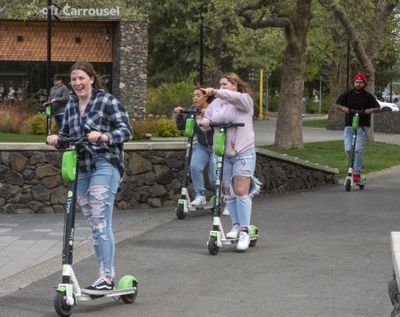Lime, city cement partnership and plan role in economic recovery

Little is certain in a pandemic, but Spokane expects to be bustling this summer – and a new agreement ensures that Lime’s scooters and bicycles will continue to be a feature of city streets.
The Spokane City Council approved a two-year extension of the city’s contract with the micromobility company, with some adjustments, last week.
Lime’s iconic green-accented scooters and bicycles landed in Spokane on a pilot basis in 2018 and have remained wildly popular ever since. After the pandemic threw the 2020 scooter season askew, Lime has high hopes for 2021 and the role its scooters could play in revitalizing a downtown hampered by virus-related restrictions for more than a year.
Entering the 2021 season, more than 900,000 scooter and bicycle trips were taken in the city of Spokane since the program began. With its fleet of nearly 1,500 scooters, Lime expects thousands of riders to hop aboard again this year – and to be more than just a passenger in the city’s economic recovery.
Boosting business is “actually our key focus for this year,” said Jonathan Hopkins, Lime’s director of strategic development for the Pacific Northwest.
Lime points to a study published by the Goizueta Business School at Emory University that compared four cities with micromobility programs like Spokane’s to four without over the course of six months in 2019.
The study claimed that cities with micromobility programs saw sales at food and beverage businesses increase by 0.6% compared to those without.
Based on that study and the size of its fleet in Spokane, Lime estimates that it generates $1.4 million in economic activity every six months that wouldn’t exist in a scooter-less city.
Essentially, Lime officials say the research confirmed their belief that scooters reduce transportation barriers and make it easier to get around – and spend money – in an area like downtown Spokane, which is ostensibly designed for cars but can be a pain to drive through and find parking .
Lime will continue to partner with Visit Spokane, the Downtown Spokane Partnership and the city of Spokane as an asset to promote economic growth, Hopkins pledged.
“We’re going to have some really concerted efforts of helping visitors and locals alike find the best of Spokane and help local businesses recover,” Hopkins said.
The Downtown Spokane Partnership has received positive feedback from businesses, according to Mark Richard, its president.
The program is “encouraging people and attracting people to get back outside, get downtown, get to safely return back to social gathering,” Richard said. “Scooters become literally a vehicle to do that with, and I think we’re already seeing it.”
It’s not just Spokane that Lime is betting on, as the company hopes to expand its presence across the Inland Northwest.
Lime is now operating in Spokane Valley and hopes to expand elsewhere, particularly places served by the Spokane Transit Authority like Liberty Lake, Airway Heights and Cheney.
Such an expansion would rival the level of service Lime offers in several communities around Salt Lake City.
“That makes the whole region more accessible to people and more accessible to tourists,” Hopkins said. “Scooters are an attractor – they encourage people to come take a look, take a visit, and people have a great time when they do.”
Enforcing the rules
The scooters were an immediate hit with those who rode them, but quickly decried as a nuisance by many who didn’t.
Since adopting the first two-year contract with Lime in 2019, the city and company have worked to ameliorate the concerns of those left frustrated by riders whizzing past them on a sidewalk or veering around a hastily discarded scooter.
The new agreement, approved unanimously by the City Council, allows the city code enforcement officers to stick Lime with a $20 fine every time they find one of the company’s scooters parked improperly.
Lime can pass that fine on to the user, who takes a photo of it after they park to prove to the company they’re abiding by the rules. Lime Patrol, the company’s own safety team, can also levy fines on users it sees breaking the rules.
To incentivize proper parking, the city has invested in scooter corrals dispersed through downtown and stenciled sidewalks with signage imploring riders to stick to the street.
There’s an etiquette learning curve in any city that adopts a micromobility program, Hopkins said, but people are getting the hang of it in Spokane.
“Just like car parking, it’s not perfect right now, but most people are doing the right thing. The number of complaints is way less,” Hopkins said.
Richard has noticed more scooters in the street and off city sidewalks.
“Until we get all of our employees back downtown there’s not quite as much pedestrian conflict as there is normally, but we’re also seeing more scooter users out in the street where they belong,” Richard said.
A robust Lime fleet also directly benefits the city.
Lime pays 75 cents per vehicle in the right-of-way per day, regardless of whether or not it’s used.
Despite limitations due to the pandemic, the city still brought in $56,888 in revenue in 2020.
“Currently, fees are used for infrastructure like parking areas and necessary detours on Centennial Trail,” city spokesperson Kirstin Davis told The Spokesman-Review. “Ideas have been shared with council for upcoming budget decisions, however, none have been finalized.”